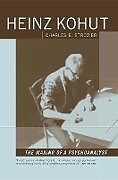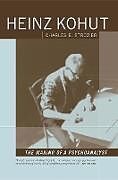Heinz Kohut
Einband:
Kartonierter Einband
EAN:
9781590511022
Untertitel:
The Making of a Psychoanalyst
Autor:
Charles Strozier
Herausgeber:
Other Press
Anzahl Seiten:
538
Erscheinungsdatum:
17.04.2004
ISBN:
1590511026
Zusatztext "A deeply informed, absorbing biography. . . . Strozier's book is an exemplary study of a psychoanalyst who threw himself into the task of transforming a major tradition." -The New York Times Book Review "This impeccably researched book, written in a clear elegant style that clarifies even complicated ideas carries us along like an exciting novel. Heinz Kohut is a magnificent contribution to the history of psychology, and beyond that, the history of ideas. Strozier has admirably succeeded in his goal of writing a biography that seeks to 'discover, illuminate, and disclose.'" - Sophie Freud, American Journal of Psychotherapy Informationen zum Autor Charles B. Strozier Charles B. Strozier is a professor of history at John Jay College and the Graduate Center, CUNY, and a training and supervising psychoanalyst at the Training and Research Institute for Self Psychology (TRISP). He is the author of Lincoln's Quest for Union: A Psychological Portrait and Apocalypse: On the Psychology of Fundamentalism in America . He lives in Brooklyn, New York. Klappentext Heinz Kohut (1913-1981) stood at the center of the twentieth-century psychoanalytic movement. After fleeing his native Vienna when the Nazis took power, he arrived in Chicago, where he spent the rest of his life. He became the most creative figure in the Chicago Institute for Psychoanalysis, and is now remembered as the founder of 'self psychology,' whose emphasis on empathy sought to make Freudian psychoanalysis less neutral. Kohut's life invited complexity. He obfuscated his identity as a Jew, negotiated a protean sexuality, and could be surprisingly secretive about his health and other matters. In this biography, Charles Strozier shows Kohut as a paradigmatic figure in American intellectual life: a charismatic man whose ideas embodied the hope and confusions of a country still in turmoil. Inherent in his life and formulated in his work were the core issues of modern America. The years after World War II were the halcyon days of American psychoanalysis, which thrived as one analyst after another expanded upon Freud's insights. The gradual erosion of the discipline's humanism, however, began to trouble clinicians and patients alike. Heinz Kohut took the lead in the creation of the first authentically home-grown psychoanalytic movement. It took an emigre be so distinctly American. Strozier brings to his telling of Kohut's life all the tools of a skillful analyst: intelligence, erudition, empathy, contrary insight, and a willingness to look far below the surface. Zusammenfassung Heinz Kohut (1913-1981) stood at the center of the twentieth-century psychoanalytic movement. After fleeing his native Vienna when the Nazis took power, he arrived in Chicago, where he spent the rest of his life. He became the most creative figure in the Chicago Institute for Psychoanalysis, and is now remembered as the founder of 'self psychology,' whose emphasis on empathy sought to make Freudian psychoanalysis less neutral. Kohut's life invited complexity. He obfuscated his identity as a Jew, negotiated a protean sexuality, and could be surprisingly secretive about his health and other matters. In this biography, Charles Strozier shows Kohut as a paradigmatic figure in American intellectual life: a charismatic man whose ideas embodied the hope and confusions of a country still in turmoil. Inherent in his life and formulated in his work were the core issues of modern America. The years after World War II were the halcyon days of American psychoanalysis, which thrived as one analyst after another expanded upon Freud's insights. The gradual erosion of the discipline's humanism, however, began to trouble clinicians and patients alike. Heinz Kohut took the lead in the creation of the first authentically home-grown psychoanalytic movemen...
Autorentext
Charles Strozier
Klappentext
Heinz Kohut (1913-1981) stood at the center of the twentieth-century psychoanalytic movement. After fleeing his native Vienna when the Nazis took power, he arrived in Chicago, where he spent the rest of his life. He became the most creative figure in the Chicago Institute for Psychoanalysis, and is now remembered as the founder of 'self psychology,' whose emphasis on empathy sought to make Freudian psychoanalysis less neutral.
Kohut's life invited complexity. He obfuscated his identity as a Jew, negotiated a protean sexuality, and could be surprisingly secretive about his health and other matters. In this biography, Charles Strozier shows Kohut as a paradigmatic figure in American intellectual life: a charismatic man whose ideas embodied the hope and confusions of a country still in turmoil. Inherent in his life and formulated in his work were the core issues of modern America.
The years after World War II were the halcyon days of American psychoanalysis, which thrived as one analyst after another expanded upon Freud's insights. The gradual erosion of the discipline's humanism, however, began to trouble clinicians and patients alike. Heinz Kohut took the lead in the creation of the first authentically home-grown psychoanalytic movement. It took an emigre be so distinctly American.
Strozier brings to his telling of Kohut's life all the tools of a skillful analyst: intelligence, erudition, empathy, contrary insight, and a willingness to look far below the surface.

Leider konnten wir für diesen Artikel keine Preise ermitteln ...
billigbuch.ch sucht jetzt für Sie die besten Angebote ...
Die aktuellen Verkaufspreise von 5 Onlineshops werden in Realtime abgefragt.
Sie können das gewünschte Produkt anschliessend direkt beim Anbieter Ihrer Wahl bestellen.
Loading...
Die aktuellen Verkaufspreise von 5 Onlineshops werden in Realtime abgefragt.
Sie können das gewünschte Produkt anschliessend direkt beim Anbieter Ihrer Wahl bestellen.
| # | Onlineshop | Preis CHF | Versand CHF | Total CHF | ||
|---|---|---|---|---|---|---|
| 1 | Seller | 0.00 | 0.00 | 0.00 |
